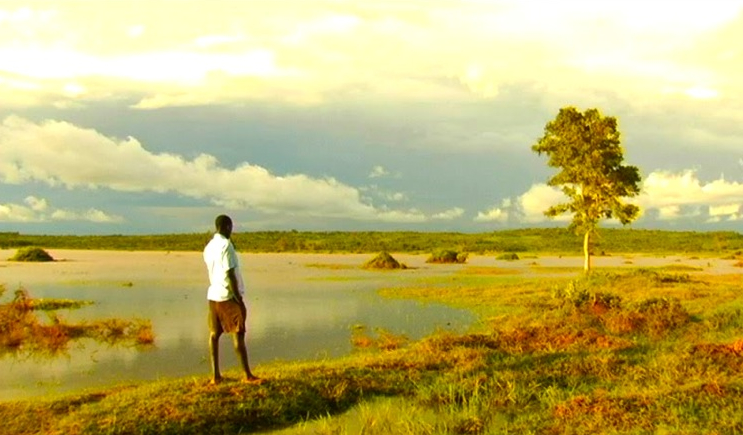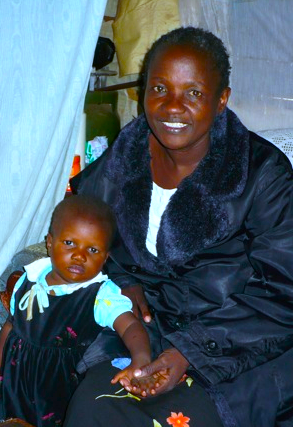
By Joe Bendel. According to filmmaker Landon Van Soest, $2.3 trillion (with a “t”) worth of western foreign aid has flowed into Africa over the last fifty years. What has been the result of these enormous outlays? Mostly ill-will and corruption according to the average Kenyans whose daily struggles Van Soest documents in Good Fortune, which airs this coming Tuesday on PBS’s POV.
UN program manager Sara Candiracci does not exactly have the common touch. The poverty of Nairobi’s Kibera slum personally offends her, which is laudable. Partnering with the Kenyan government, the UN is launching an ambitious redevelopment project for Kibera. However, she admits up front: “the strategy to move people and to bring them back is still not clear” – yet the residents should welcome the project anyway.
Kibera might be an eyesore to Candiracci, but it represents a better way of life for midwife Silva Adhiambo. Finding ample work there, she happily calls it home. In one telling scene, she perfectly illustrates why Kibera is so skeptical of the UN’s plans. The so-called slum is actually surrounded by three modern housing developments. One high-rise estate was billed as low income housing during construction, only to become home to well-connected government officials when completed. Another neighboring housing project remains unfinished due to litigation stemming from government embezzlement. A third development was allegedly built by Kenya’s First Lady with western aid money earmarked for AIDS programs – and then sold for a tidy profit. Indeed, having gone down this road before, the Kibera neighborhood is dead-set against the UN project, but Candiracci and the Kenyan government are not listening.

It is refreshingly shocking to watch a documentary so openly skeptical of the UN (on PBS no less). However, over in the rural Yala region, Fortune finds itself in more familiar documentary territory, as it openly questions the policies of Dominion Farms, an Oklahoma-based agri-business led by Calvin Burgess, its evangelical (but extremely un-media savvy) CEO. Burgess is determined to make the Yala Swamp Africa’s breadbasket, so he has flooded the area to create a state-of-the-art rice paddy. Unfortunately, that has wrecked the livelihood of local herder Jackson Omondi. He also accuses Dominion of using harmful chemicals, a charge which the company is not allowed air time to rebut (at least in the broadcast cut).
Overall though, Fortune is quite even-handed, casting western agribusiness, the UN, and the national Kenyan government in the same unflattering light. However, at least Dominion is really doing what they say they are (whether the community wants it is another question). As for that temporary housing Candiracci promises, none is ever seen in the film. Yet plenty of squats are demolished for the sake of the UN project.
Van Soest strictly adheres to a fly-on-the-wall perspective, simply filming his POV figures as they struggle with the consequences of this unwanted help. As a result, there are not a lot of opportunities to add extraneous editorial commentary. Still, there are plenty of field interviews with Burgess and Candiracci, but neither proves to be a persuasive spokesman.
Whether it is a fair to call Candiracci a hypocrite is debatable, but it is clear she has contempt for small projects, favoring big, conspicuous undertakings. Yet it is the microcredit concept championed by Nobel Peace Prize winning economist Muhammad Yunus that seems to have the greatest multiplier effect for developing economies. Of course, a two hundred dollar loan to a budding Kibera entrepreneur probably would not sound as impressive on the NGO cocktail circuit.
To its credit, Fortune stimulates discussion of these sorts of issues. Van Soest also avoids portraying Adhiambo and Omondi as helpless victims, emphasizing their resiliency instead. Yet, it is hard not to get angry watching all the arrogance and corruption captured in the film. Well worth viewing, Fortune airs this coming Tuesday (7/13) on most PBS stations as part of the current season of POV. It will also be available for online streaming through the POV website beginning Wednesday (7/14) through October 12th.
Posted on July 10th, 2010 at 10:37am.
This reminds me of the issues raised in the film “Without Borders” (I think that’s the title) with Angelina Jolie. The dishonest thing though is that in that film, the blame was almost exclusively laid on Western governments like America, claiming that for right-wing political reasons (i.e., they don’t want to give money to Communist governments, even if those Communist governments are helping the people) they don’t want to give money to Africa. The movie was completely PC and unwilling to blame the corruption of the African governments themselves. Guess it would have spoiled Angelina Jolie’s photo-op.
this is one of those damned if you do, damned if you don’t situations. i really feel sorry for these people.. because of the corruption they have to put up with.
It’s true.
The UN is a disaster. They should be defunded for the callous manner in which they waste money and disregard the real needs of the poor in the developing world.
All I can say, is anyone surprised, besides the lefties? Foreign aid is Welfare on an international scale. America redistributes it’s wealth because, well, we owe it to them because we’re successful and they’re not. And the lefties have the added incentive of helping people who have melanin in their skin (because to a leftie having melanin means you’re a perpetual victim, incapable of even basic self sufficiancy). Meanwhile, those Kenyans with drive and ambition get shafted because their government has a incentive to continue failed socialist/marxist policies that keep Kenya (and the rest of Africa) in a never-ending cycle of poverty.